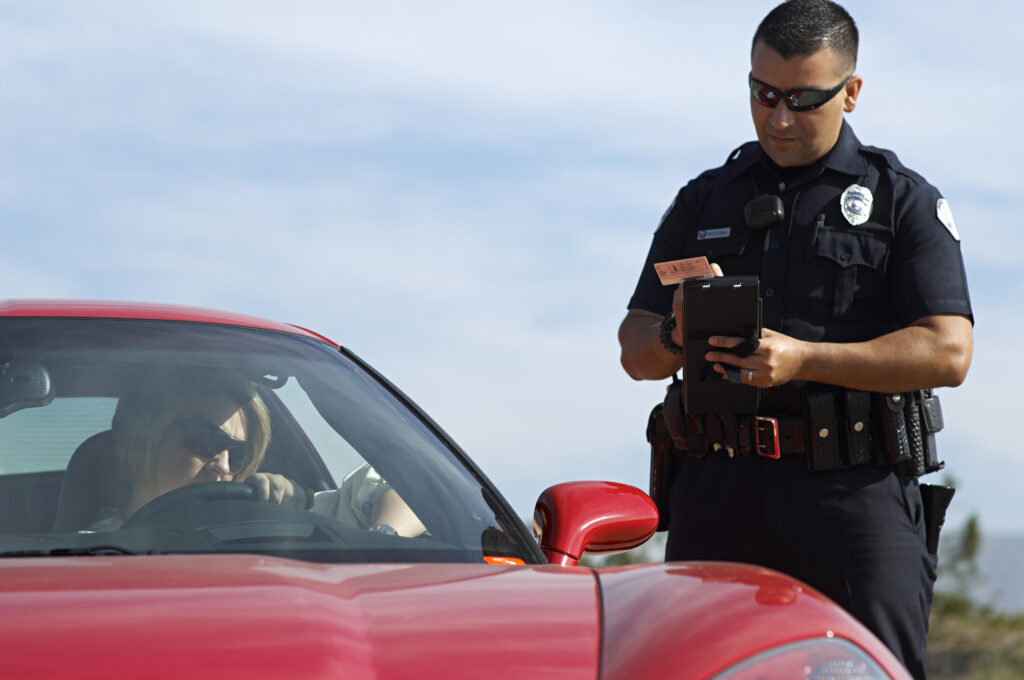Reckless driving is a very serious violation. If you get one, you’ll face dire legal consequences. You can also expect it to negatively impact your auto insurance, sometimes to the point of losing your policy with your current insurer.
In this article:
- What is reckless driving?
- Penalties for reckless driving
- How it affects car insurance
- High-risk auto insurers
- State-assigned risk pools
- An SR-22 may be required
- How long reckless driving stays on your record
- Frequently asked questions
What Is Reckless Driving?
While it can vary by state, reckless driving is usually when a person drives a vehicle with a willful or wanton disregard for the safety of those around them. In other words, you’re guilty of this if you ignore laws and intentionally drive in a way that could injure others or damage property. Authorities in some states call this offense “careless” or “dangerous” driving.
The police can arrest you if they decide that your behavior behind the wheel was bad enough to put others in danger. Here are some examples of actions that can lead to a reckless driving citation and conviction:
- Driving drunk or intoxicated
- Illegally passing a school bus
- Street racing (even if you weren’t going over the speed limit)
- Aggressive or erratic driving
- Operating an unsafe vehicle (e.g., a car with illegal modifications or a previously totaled vehicle with a salvage title)
- Doing donuts or drifting
- Driving distracted (e.g., texting, taking selfies, putting on makeup, or eating) while at high speeds
- Driving without headlights in the dark
- Driving at high speeds in a school zone
Penalties for Reckless Driving
If you’re caught and charged for driving recklessly, you’ll face often expensive fines, jail time, and losing your license. For example, in Texas, a conviction carries a penalty of no more than 30 days in jail and/or a fine of up to $200. Some states may also suspend your license immediately after you’re convicted.
Penalties could get even worse if your actions resulted in death, injury, or property damage. In many states, this is a felony and typically means you’ll have to pay increased fines and spend extended time in prison. In Nevada, for instance, careless driving that causes death or significant injury has a penalty of at least one to six years in jail and a fine of $2,000 to $5,000.
How It Affects Car Insurance
As is the case with all severe traffic violations, reckless driving is sure to adversely affect your insurance. Your insurer might cancel your policy or not to renew it, causing you to hunt for a new company. Whether you get to stay with your current provider or must find another one, your rates are going to increase, often by a lot.
Your driving record is a major rate factor, among other things such as your claims history, the car you drive, and where you live. Even just one severe violation can make your insurer rethink how much to charge you or whether they want to sell you insurance at all.
After committing a serious offense, you’ll appear at risk to get into an accident or cost your coverage provider money. Companies will classify you as a high-risk driver. This can make it hard to get insurance from most insurers. The following are some options for people struggling to get insurance after a severe violation:
High-Risk Auto Insurers
One of the top ways to get coverage after a bad driving violation is to buy a policy from a high-risk insurer. Sometimes known as non-standard companies, these carriers specialize in providing auto insurance to high-risk drivers.
Non-standard companies are often much more expensive than traditional insurers, mostly because of their demand and the risk they assume. But it’s often one of your only options following a severe conviction such as reckless or drunk driving.
Below are some insurance companies that sell policies to high-risk drivers:
- Allstate
- Progressive
- Direct Auto
- Farmers
- GEICO
- The General
- Safe Auto
- Dairyland
- Nationwide
- Infinity
- Bristol West
- State Farm
- 21st Century
- Kemper
- Gainsco
- Vern Fonk
The above listing is in no order. For a better idea of which insurer is right for you, we recommend reading our article on the best insurers for a bad driving record. There, we outline and rank the top insurers that sell policies to people with severe violations on their records.
State-Assigned Risk Pools
Another way to get insurance as a high-risk driver is to enter your state’s assigned risk pool. This is where you enter a pool for high-risk drivers, allowing your state to assign you to an insurer. Companies in the pool must provide you coverage, even after a bad violation.
Due to your increased level of risk, rates in the pool aren’t going to be cheap. But, at the very least, you’ll have enough coverage to satisfy your state’s insurance laws. Consult your state’s insurance website or get in contact with an agent to enter a state-assigned risk pool.
An SR-22 May Be Required
Your state may require you to file an SR-22 form following a reckless driving conviction. This certifies that you have your state’s minimum required liability insurance. Since you could lose your current policy after a severe traffic violation, the state wants to make sure you maintain coverage. This helps you avoid a lapse, which is when you go through a period without car insurance.
Depending on your state’s laws, an SR-22 requirement could last for multiple years. Your insurance company should be able to help you file an SR-22 with your state if you’re required to do so.
How Long Reckless Driving Stays on Your Record
The amount of time an offense will stay on your record varies by state. Some may only keep it on your record for as low as three years. Others, such as California, leave it on your record for as long as ten years.
It’s also important to remember that your driving record isn’t equal to your criminal record. Because driving recklessly is a misdemeanor offense in many states, it’s likely to permanently follow you around on your criminal record. This is even the case if it disappears from your driving record.
Frequently Asked Questions
Does each state set different definitions for reckless driving?
What counts as reckless driving can be different from state to state. In general, though, you’ll face charges if you intentionally throw caution to the wind, even if you know other people can get hurt.
How much will my car insurance cost after a reckless driving conviction?
Your rates will certainly go up after being caught driving recklessly, but how much will depend on several factors. Here are some examples:
- Where you live. Rates are more likely to increase if you live in a city with lots of car accidents.
- Your credit score. Bad credit signals to insurers that you may not be a good customer. This can give you a higher chance of receiving a price hike.
- Your driving record and claims history. Your prices will increase if you get lots of tickets or have a habit of filing claims.
- Your age. Young drivers (under 25) and older drivers (65+) pay more for insurance. An offense on top of either age will spike your rates.
What should I do if my insurance company drops me after a reckless driving offense?
If your auto insurer drops your policy, your priority should be finding another company as soon as possible. Not doing so could cause you to experience a lapse in coverage. This can raise your rates even further than they already will be after a careless driving violation.
If you’re having trouble finding a standard company to insure you, your best bet will be a non-standard company. You could also try entering your state’s assigned risk pool for high-risk drivers.
Is reckless driving a felony or a misdemeanor?
Reckless driving is usually a misdemeanor offense. But it can also be a felony in some cases. This is typically when you’ve caused serious bodily injury or death. In either case, you can expect the following penalties if you’re convicted:
- Jail time
- Fines
- License suspension or revocation
- High insurance premiums
- Legal fees if you need to hire a lawyer
- Lost time at work from going to jail or appearing in court


